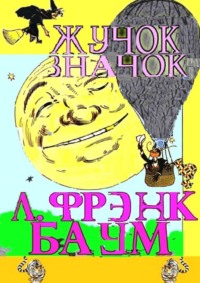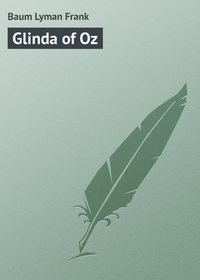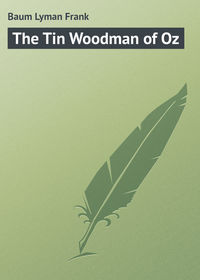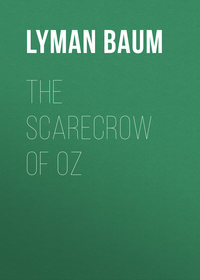 полная версия
полная версияDot and Tot of Merryland
"What a queer place this is," she continued, looking around them. "I don't believe anyone has ever been here before. Let us give it a name. That's what all explorers do. We'll call it Stony Vale."
"All right," said Tot, contentedly. Then he stretched out his arm and pointed to something that was moving among the stones.
"See!" he said. "Funny man."
"Why, I really believe it is, Tot!" exclaimed the girl, looking toward the place. "No, it isn't a man; it's a bear."
"Bear!" repeated Tot, with wide open eyes. "Funny bear!"
Halfway up the valley they saw a shaggy-looking creature sitting upon a rock. It seemed to have the form of a man, as Tot had first declared; but it was covered with long, thick hair, which made Dot decide it must be a bear.
Whatever it was, the creature was surely alive, and it had also seen the boat, for the next moment it rose from the rock and came bounding down to the shore of the river, leaping from stone to stone, and moving so swiftly that its long hair streamed out behind it in the wind.
The boat was now being carried by the current directly toward the shore, and soon its front end touched softly upon the gravelly beach. At the same time the strange creature drew closer to them and sat down upon a big stone only a few feet away.
Dot and Tot had been watching it, and now saw that what they had taken for a bear was an old man, with whiskers and hair so long that they reached down to the soles of his feet, and probably would have grown still longer had not the rough stones worn away the ends of the hair. Not a bit of his body could be seen; the flowing white hair covered him everywhere like a gown, except upon the top of his head, which was smooth and bald. So thick, indeed, was the covering that when he stretched out his arms, the old man could only push his hands and wrists through the masses of hair.
The curious appearance of this strange person surprised the children, and they remained for some time staring at him without trying to say a word.
The hairy man looked at them, in return with equal interest, and was the first to speak, saying in a mild, sad voice:
"Strangers, who are you?"
"I'm Dot, sir," answered the girl. "Dot Freeland."
"She's Dot F'eelun'," repeated Tot.
"And this is my friend, Tot Thompson," she continued.
"I'm Tot Tompum," said Tot gravely.
"Oh," replied the man. "I'm pleased to make your acquaintance. I'm the Watch-Dog of Merryland."
"What a queer name!" exclaimed Dot. "Why do they call you that?"
"Because I'm placed here to keep everyone from passing through the archway that spans the river into the fair and happy valleys of Merryland."
"How can you keep them from passing through?" asked the girl.
"Why, tell them they mustn't, of course."
"But suppose they won't mind you, what will you do then?"
The old man looked puzzled, and shook his head slowly.
"I'm sure I don't know what I could do in that case," he answered. "You see, no one has ever before come here since I was commanded to guard the entrance to Merryland."
"How long have you been here?" inquired Dot.
"About three hundred years, I think; but I've lost track of the exact time."
"Don't you ever die?" asked Tot wondering at this great age.
"I haven't died yet," answered the old man, thoughtfully.
"But you will, won't you?" persisted the boy.
"Why, I suppose so, if the Queen lets me," was the reply.
"Who is the Queen?" questioned Dot.
"She who rules Merryland," answered the man.
Then, for a few moments, there was silence, while Dot and Tot stared at the hairy old man and he stared at them.
Presently Dot broke the silence the stillness by asking, "What do you do in this lonesome place, where you have no one to talk to?"
"Why, most of the time I watch, as it is my duty to do. And when I get lonely, I count my whiskers."
"Oh!" said Dot. Then she inquired, curiously, "How many whiskers have you?"
"Well," answered the Watch-Dog of Merryland, confidentially, "there are either eighty-seven thousand four hundred and twenty-six, or else eighty-seven thousand four hundred and twenty-eight. Sometimes I make it one figure and sometimes the other, so I can't really tell which is right. I was engaged in counting my whiskers when I looked up and saw your boat. I had then counted sixty-nine thousand three hundred and fifty-four; but I was so surprised to see you that I missed the count, and now I shall have to begin all over again."
"I'm sorry," said Dot, sympathetically; "I'd like to know just which is the right number."
"If you will wait I'll count them," he replied, eagerly. "Perhaps then you can tell if I make a mistake."
"How long will it take?" she asked.
"I can do it in about four months."
"Oh, we couldn't possibly wait that long," declared the girl. "I really think we should be going now."
"Where will you go?" he asked.
"There is only one way for us to go – through that archway into Merryland, as you call it. We are not strong enough to pull the boat upstream, so we must let it float where it will."
"It will be a terrible disgrace to me," said the Watch-Dog of Merryland, in a solemn voice, "if you escape me. What will the Queen say when she knows I have watched here three hundred years without seeing anyone, and then allowed the first strangers who came along to pass through the archway?"
"I do not see that she can blame you," returned Dot. "You say yourself you would be unable to stop us if we decided not to mind you. So the Queen can only blame us for not minding you."
"That is true," said the old man, more cheerfully.
"Want somethin' t'eat?" inquired Tot, holding out a slice of jellycake.
"Dear me!" said the Watch-Dog, taking the cake in his hand and looking at it with much curiosity. "What is it?"
"Eat it," said Tot; "it's good."
"But I can't eat," replied the old man. "I don't know how. I've never eaten anything in my life."
"Not even when you were a little boy?" Tot asked, in wonder.
"Well, I've forgotten what happened when I was a little boy, it's so long ago," returned the man. "But I certainly have no desire to eat now, and if I had there is nothing in the Valley to devour except stones. I suppose eating is a habit you have acquired. Why don't you break yourself of it?"
"I get hungry," answered Tot.
"Hunger must be a habit, too," remarked the old man, "for I never have had it since I have been in this valley. However, if you will allow me to keep the cake, I will amuse myself by looking at it when I'm tired of counting my whiskers."
"You are quite welcome to the cake," said Dot. "But now I must ask you to excuse us, for it is time we started upon our journey."
"Oh, don't let me detain you," replied the Watch-dog of Merryland, politely; "that is, if you are determined to disobey my orders."
"I fear we must," said the girl. "Is Merryland the other side of that archway?"
"Part of it is," answered the old man. "There are Seven Valleys in Merryland, connected by archways, for the river flows through them all."
"And what is beyond the Seventh Valley?" asked Dot.
"No one knows except those who pass through, and those who pass through never return to tell," he replied.
"Well, good-bye," said Dot.
"Bye!" repeated Tot, briefly.
"Good-bye," answered the Watch-Dog.
The girl took the remaining oar and pushed the boat away from the shore with it. The little craft glided out into the river very slowly, and drifted along with the current in the direction of the archway.
Dot and Tot sat on the seat and watched the friendly old man until a shadow fell upon them, and called their attention to the fact that they were passing through the arch into the First Valley of Merryland.
CHAPTER VI. – The First Valley
The rocky arch was not very thick, yet before Dot and Tot had floated to the other side of it, shouts of merry laughter and the chattering of many voices came to their ears. Some of the voices sounded loud and shrill, others low and deep, but all rang with a happy tone that aroused the children's interest at once, and made them wonder what occasion could cause so much amusement.
Then, so suddenly that it quite startled the childish voyagers, the boat glided from the archway into the most beautiful country one could imagine.
It was a Valley, as the Watch-Dog had said; but it was level and sunny and dotted with broad-leaved trees; while soft, tender grasses, mingled with brilliant flowers, covered the ground in every direction. There seemed to be no houses at all, yet streets were laid out in regular order, having at their sides raised platforms in place of houses. Each of the platforms was four feet high and fifteen feet square on the top, and they were separated from one another by stretches of the flower-strewn lawn. The top and sides of every platform were padded like the mattresses of a bed, and were covered with silks and velvets of the most gorgeous patterns, no two being of the same combinations of colors.
On many of these raised and padded platforms, Dot and Tot saw groups of funny-looking Clowns, all dressed in wide, baggy trousers, puffy jackets and soft, pointed caps. Yet in their costumes was an endless variety of colorings and combinations of colors, making the groups look remarkably bright and pleasing.
The faces of the Clowns were painted in a fanciful way, with rings of red and blue and yellow on their cheeks, and spots and streaks of the same gorgeous colors over their eyes and around their chins.
When the children first came into the Valley of the Clowns, they saw many of them leaping and tumbling and turning somersaults upon the platforms, while others were juggling with balls, or balancing long feathers and sticks upon their noses and chins. These feats were greeted with shouts of laughter by other Clowns who were resting and looking on, and these spectators also cried out their approval or poked fun at the performers when they failed to accomplish the acts they were attempting.
While Dot and Tot sat in their boat, looking with amazement at the strange sights all about them, one of the Clowns chanced to look their way, and upon seeing the children, he set up a shout and rushed down to the shore, followed by more than a hundred of his fellows.
As they ran, the Clowns leaped over one another, turned somersaults into the air, and walked upon their hands nearly as fast as they could upon their feet; and so swift were all their movements that, in less time than one could think possible, they were all crowded along the river bank, and shouting loud greetings to the new arrivals.
Dot had to put her fingers in her ears at first, for the noise bewildered her, and while she wondered what she should say to these lively creatures, she noticed a richly dressed Clown standing before the others, and making low bows to her and to Tot. As his lips seemed to move, she took away her fingers from her ears that she might hear what he was saying.
Everyone was talking at the same time, and at first Dot could hear nothing plainly; but the Clown who was standing in front of his comrades clapped his hands loudly together three times, at which the others instantly became silent and motionless.
Then, with another bow, the leader addressed her, speaking in a sweet and most pleasing tone of voice, "Welcome, O King and Queen of Children, to the Valley of Clowns! We live but for your amusement; we love your happy and smiling faces more than anything else in the world, and this day on which you have come to visit your slaves is the most joyful we have ever known."
Here he made another bow and threw his pointed cap high into the air, where it whirled over and over and finally fell straight upon his head again. There was a shout of applause at this feat, and Tot laughed loudly and clapped his hands.
Then the leader of the Clowns again spoke, "If you will graciously consent to land in our country, where everything we have is at your service, we shall be delighted to amuse you to the best of our ability."
"You are very kind," answered Dot, "and as we are tired by sitting in the boat so long, we shall be glad to accept your invitation."
Then she pushed the boat to the shore, where a dozen Clowns seized it and drew it far up on the grassy bank. Then Dot and Tot stepped out upon land, and as they did so every Clown present turned a backward somersault and shouted, "Here we are again!"
The one who had first spoken to them now came forward and shook hands with both Dot and Tot in a very polite manner.
"My name is Flippityflop," he said, "and I am the Prince of Clowns, ruling here under the gracious favor of her Majesty the Queen of Merryland. I beg you will allow me to escort you to my dwelling; but first I should like to know your names, and how you came here."
"I'm Tot Tompum," said the boy, looking up into the Clown's painted face, "and here's Dot F'eelun. We've come in a boat, long, long ways off. An' we don't know how to get home again."
"We are delighted to have you with us, however you came here," replied the Clown; "and as for your getting home again, why, that is worry, and no one ever worries in the Valley of Clowns. You are welcome to remain our guests as long as you please, and while you are with us you must consider us your slaves, for Clowns have always been the slaves of children." Then he turned to the others.
"Brothers!" he shouted. "Allow me to introduce you to our friends Dot and Tot, of the Big Round World. We are all their slaves. Salute them!"
Instantly every Clown stood upon his head and knocked his heels together in the air. As they wore silver bells around their ankles, this made a most delightful, tinkling sound, and the sight of so many topsy-turvy Clowns was so pretty that Dot and Tot both laughed and clapped their hands.
Then Flippityflop caught the children in his arms and seated one of them upon each of his shoulders, after which he marched up the street, followed by the rest of the Clowns, who sang and danced as they came.
The Prince carried them to one of the prettiest platforms and set them gently upon its cushioned top. Then he leaped into the air, whirled around like a windmill and landed gracefully beside them.
"Welcome to my dwelling," he said.
"But this isn't a dwelling," exclaimed Dot. "A dwelling is a house."
"And this is a sofa!" declared Tot.
"Oh, no; it's a real house," said Flippityflop, "although it may be different from the dwellings you are accustomed to. Let us enter."
He seized a silken strap and opened a trap-door in the top of the platform.
"Come on!" he cried, and jumping down the hole, disappeared from view.
Dot crept up to the trapdoor and looked down. Just beneath her was Flippityflop, holding out his arms.
"Come on!" he said again; "I'll catch you."
Dot did not hesitate, but dropped through the opening, and the Prince caught her safely in his arms. Tot followed a moment later, and then the children gazed about them curiously.
CHAPTER VII. – The Clown Country
Flippityflop's house proved to be one big room, built under the platform, and lighted by a soft glow from hidden electric lamps. The walls were covered with bright-yellow silk hangings and on the floor was a crimson carpet. All around the sides were wide benches with soft cushions of purple velvet, and near the middle of the room was a small table of blue and silver. On the walls Dot noticed several gaudily colored pictures of Clowns, and when Flippityflop saw the children looking at these pictures he said:
"Those are portraits of my father and grandfather and great-grandfather. They were all Princes of this Valley of Merryland, as well as good men and clever Clowns. Therefore I am proud of them."
"They look very jolly," said Dot.
"They were jolly, and proved a comfort to thousands of children. But you must be hungry, and I trust you will allow me to offer you some dinner. What will you have?"
"What you got?" inquired Tot.
"Well, I have in my cupboard some fried goldfish, boiled buttercups and pickled shoelaces," he answered.
"Don't want any," said Tot.
"These seem rather foolish things to eat," remarked Dot.
"Of course, they are foolish things," agreed Flippityflop, cheerfully. "Everything we do here is foolish. You certainly can't expect wisdom in a country of Clowns."
"Course not," said Tot.
"If you'll send to the boat for our basket, I think we will prefer to eat the things we brought with us," declared Dot.
"Certainly!" answered the Prince, and immediately sticking his head through the trapdoor, he asked a Clown who stood outside to fetch the basket.
It came in a remarkably short time, and then Flippityflop assisted Dot to lay the cloth on the blue and silver table, while the children proceeded to eat of the sandwiches, cake and apple-tarts that remained in the basket.
"Wouldn't you like something to drink?" asked the Prince.
"I am rather thirsty," admitted Dot; "have you any milk?"
"No, we do not use milk in this Valley," he answered. "But we have some excellent green paint, or, if you prefer it, I can give a bottle of red mucilage."
"No, thank you," said Dot; "we couldn't drink those. Perhaps you will bring us some fresh water from the river."
"But the water is quite wet," exclaimed the Clown, "and is liable to make you damp. Surely you won't think of drinking it!"
"Oh, yes; we're accustomed to drinking water," said the girl.
So the water was sent for, and Dot and Tot took long and refreshing drinks, although their action alarmed Flippityflop, who urged them to eat a few handfuls of sawdust afterward to absorb the dampness.
"Do all the Clowns live in this Valley?" asked the girl, when the table was cleared.
"Yes, all except those we send into the world to amuse the children," answered Flippityflop. "You see, we train them all very carefully, and every year one is selected to go into the world."
"How do they get there?" asked the child.
"At the upper edge of our Valley there is one place not so steep as the rest. The Clown who is leaving us climbs to this place and finds himself on the top of a mountain. So he makes himself into a ball, as he has been taught to do, and rolls down the mountain into the outside world, where he travels around until he finds a circus to join."
"Oh!" exclaimed Dot. "I've seen 'em – in circuses."
"To be sure; that's the proper place for Clowns. Do they make the children laugh?"
"Sometimes," said the girl.
"When they do not," said Flippityflop, gravely, "they are imitation Clowns, and were never trained in this Valley of Merryland. The real Clowns are sure to make you laugh. But come, it is time our people were gathering on the platforms for their evening practice. Would you like to watch them?"
"Yes, indeed!" cried Dot, joyfully; and Tot clapped his hands and echoed: "'Deed, yes!"
So Flippityflop lifted them through the hole to the top of the padded platform, where they saw a strange and merry sight.
All the platforms on both sides of the street were now occupied by Clowns, who were performing in a most marvelous manner. The trees were full of electric lights, which shed brilliant rays over the scene and enabled the children to see everything distinctly.
"Come with me," said their friend, "and I will lead you through the street, that you may see what my brothers are doing."
They left the Prince's platform and came to the next, where three gaily dressed Clowns were bounding into the air and whirling around before they came down again. Every time they jumped they cried: "All right, Mr. Johnson!" in their shrill voices, and often one of them would fall on his head or back instead of landing on his feet. When this happened they were not hurt, for the platform was soft and yielding; so they sprang up at once and tried it over again, laughing at their own mishaps.
At the next platform were some juggling Clowns. One of these placed a light ladder on his shoulders, and another ran up it and stood upon his head on the top rung.
In another place the Clowns threw small silver balls into the air, one after the other, and then caught them cleverly as they came down.
Near the end of the street a Clown, dressed in a costume of scarlet with green spots upon it, and wearing a white, pointed cap upon his head, was singing a comic song. They stopped to listen while he sang as follows:
A goat to a barber went one day;"Just trim my beard," the goat did say,"And cut my hair in a stylish way" —Sing shivvy, shovvy, shavey!The barber then began to snip,But soon he let the scissors slip,And cut the goat upon his lip —Sing shivvy, shovvy, shavey!Then Mr. Goat, with angry bleat,Gave one big jump from out his seat,And knocked the barber off his feet —Sing shivvy, shovvy, shavey!"Enough!" he cried, "I'll have you know,If barbers treat their patrons so,I'll just allow my beard to grow!"Sing shivvy, shovvy, shavey!After each verse another Clown cracked a long whip at the singer, which made him leap into the air and screw his face up in such a comical way that Dot and Tot were greatly amused, and applauded him rapturously.
Just across the street was another singing Clown; but this one was dressed in a curious costume that was all white on one side of his body and all red on the other side. This fellow balanced the point of his cap upon the end of his nose, and then, making a bow, sang the following song:
Little Tommy HarrisMade a trip to Paris.There he went within a tent,Saw a convex firmament;Then he peered within a booth,Saw a shark without a tooth,Heard a dumb man sing and chant,Saw a crimson elephant.Next he walked into a street,Saw a lamp-post drink and eat,Heard a turtle loudly roar,Saw a rainbow through a door.Then a man without a legDanced upon a horse's egg.Then a steeple on a domeCried, "My boy, you'd best go home."But as Tommy homeward sped,He awoke – and was in bed!Little Tommy HarrisNever went to Paris!This singer had so droll an expression on his face that Tot yelled with rapture, and Dot found herself laughing heartily. Indeed, the whole performance was a delight to the children, and they were sorry when a bell rang and put a stop to the antics of the Clowns.
At once the they all dived into the trapdoors of their platforms, and Flippityflop said they had gone to bed and would not appear until the next morning.
The children were somewhat tired by the adventures of the day, so when Flippityflop helped them to gain the room under his platform, they crept to the soft-cushioned benches that lined the walls and lay down. In less than a minute Dot and Tot were fast asleep, curled up side by side, with their arms entwined.
Next morning they were awakened by the strains of sweet music. Dot at once sat up and asked, "What is that?"
"That is my alarm clock," answered Flippityflop, who had been reclining upon a bench at the other side of the room. "It tells me when it is time to get up."
"It's a queer alarm clock," said the girl.
"But a very good one," returned the Clown. "It is really a big music-box under the bench, which starts playing every morning at seven o'clock. So, instead of being awakened by a rattling and clanging of bells, such as most alarm clocks make, I open my eyes with a sensation of pleasure, and get up feeling jolly and content.
"I think it's a lovely clock," said Tot.
"Won't you join me at breakfast?" asked the prince. "I'm going to have a dish of scrambled egg-shells and a few fried buttons. The eggshells make our complexion white and chalky, and we are very fond of them."
"I prefer to eat something from our basket," replied the girl. "But Tot may eat the egg-shells and buttons, if he wants them."
"Don't want 'em!" cried Tot. "Want bread and butter."
"Well, I declare!" said the Clown. "What peculiar tastes you children have!"
But he allowed them to breakfast from their own stock of food, and when the meal was finished Dot said, "We must be going now; but first I wish to thank you for the pleasant time we have had in your Valley. We enjoyed the Clowns very much indeed."
"Nice Clowns," declared Tot, with emphasis.
"I'm sorry to have you go," said Flippityflop, "but I suppose you cannot stay here always, especially as you are going to visit our Queen."
Then he carried the big basket down to the boat for them, and all the Clowns came to the river bank in a long procession, to bid them good-bye.









